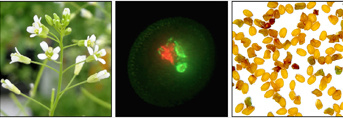HDR defense: Filipe Borges
Epigenetic control of transposon activity and dosage in pollen and hybrids seeds
In most flowering plants, twin sperm cells embedded within the cytoplasm of the growing pollen tube are transported to the embryo sac where double fertilization takes place. Understanding the molecular mechanisms by which the gametes mature and take part in fertilization are crucial goals in the study of plant reproduction. During my PhD, I developed and optimized methods to purify sperm cells in the model species Arabidopsis thaliana based on fluorescence-activated cell sorting (FACS) techniques, thus allowing the first analysis of their transcriptome at a genome-wide level. Comparative transcriptome analysis with sporophytic tissues has shown that sperm cells have a distinct and diverse transcriptional profile, but I became particularly interested in small RNA and DNA methylation pathways that were still poorly understood. Epigenetic silencing mechanisms likely evolved to control virus and transposable elements (TEs) that are highly abundant in eukaryotic genomes, which is particularly important in the gametes that contribute genetic material to the next generation. In A. thaliana pollen, TEs are transcriptionally reactivated in the germline companion vegetative cell, which coincides with the loss of heterochromatin and biogenesis of TE-derived siRNAs. We then performed genome-wide analysis of DNA methylation of different stages of pollen development, to demonstrate that DNA methylation is specifically lost in the vegetative cell at well-known targets of the RNA-directed DNA methylation (RdDM) pathway. These results suggested that targeted demethylation of TEs in the pollen vegetative cell could facilitate germline reprogramming and epigenetic inheritance via mobile siRNAs. In plants, small RNA-mediated epigenetic silencing requires microRNAs (miRNAs) and small-interfering RNAs (siRNAs) that mediate transcriptional and post-transcriptional gene silencing. During my postdoctoral research, I have focused mainly on the highly conserved miR845 family that targets specifically retrotransposons. Strikingly, we found that miR845 activity in pollen triggers biogenesis of epigenetically activated siRNAs that mediate interploidy hybridization barriers between diploid seed parents and tetraploid pollen parents (the "triploid block"), thus suggesting a uniquely sensitive means to monitor chromosome dosage and genomic imprinting in the developing seed.
I was recruited by INRAE in the 2017 competition for experienced researchers (CR) and joined the IJPB unit of Versailles in April 2018, where I am now leading the "Epigenetics, Reproduction and Transposable Elements" EPIREP team that was formed in 2022 together with Marie-Angèle Grandbastien. Our current research focus on elucidating the role of miR845 and TE-derived siRNAs in germline reprogramming and transgenerational inheritance of the triploid block. For this, we developed a new molecular technique to suppress siRNA biogenesis during pollen development via ectopic expression of the antiviral RNaseIII-like protein RTL1. Notably, this strategy allowed demonstrating that siRNAs involved in the triploid block are produced in the pollen vegetative cell after meiosis, thus supporting the existence of mobile siRNA signals that promote epigenome reprogramming in the gametes, or in the seed after fertilization. The targets of pollen siRNAs responsible for the triploid block remain mysterious, but our recent results have shown that hypermethylation at TEs flanking imprinted loci is required to build a strong triploid block response. However, is still largely unclear how parental small RNAs and DNA methylation are able to sense variations in transposon dosage and activity in pollen and hybrid seeds. These questions are the main focus of two PhD students (Armand Garcia and Jiahao Wang) that I currently supervise, with the help of two permanent staff members Corinne Mhiri (IR) and Matthieu Simon (IE). My goal is to establish a multidisciplinary and international research team with strong motivations to build new avenues between epimutagenesis and crop improvement, which is an area of research that is still poorly explored but holds great promise for modern plant breeding.
Jury members
> Karine Alix (Rapportrice) - AgroParisTech, GQE-Le Moulon, Gif-sur-Yvette
> Vincent Castric (Rapporteur) - CNRS, EEP, Villeneuve d’Ascq
> Todd Blevins (Rapporteur) - CNRS, IBMP, Strasbourg
> Angélique Déléris (Examinatrice) - CNRS, I2BC, Gif sur Yvette
> Thomas Widiez (Examinateur) - INRAE, RDP, Lyon
Contact, Philippe Borges,
Habilitation to supervise research
Research developed at the Institute Jean-Pierre Bourgin for Plant Sciences.
Back
